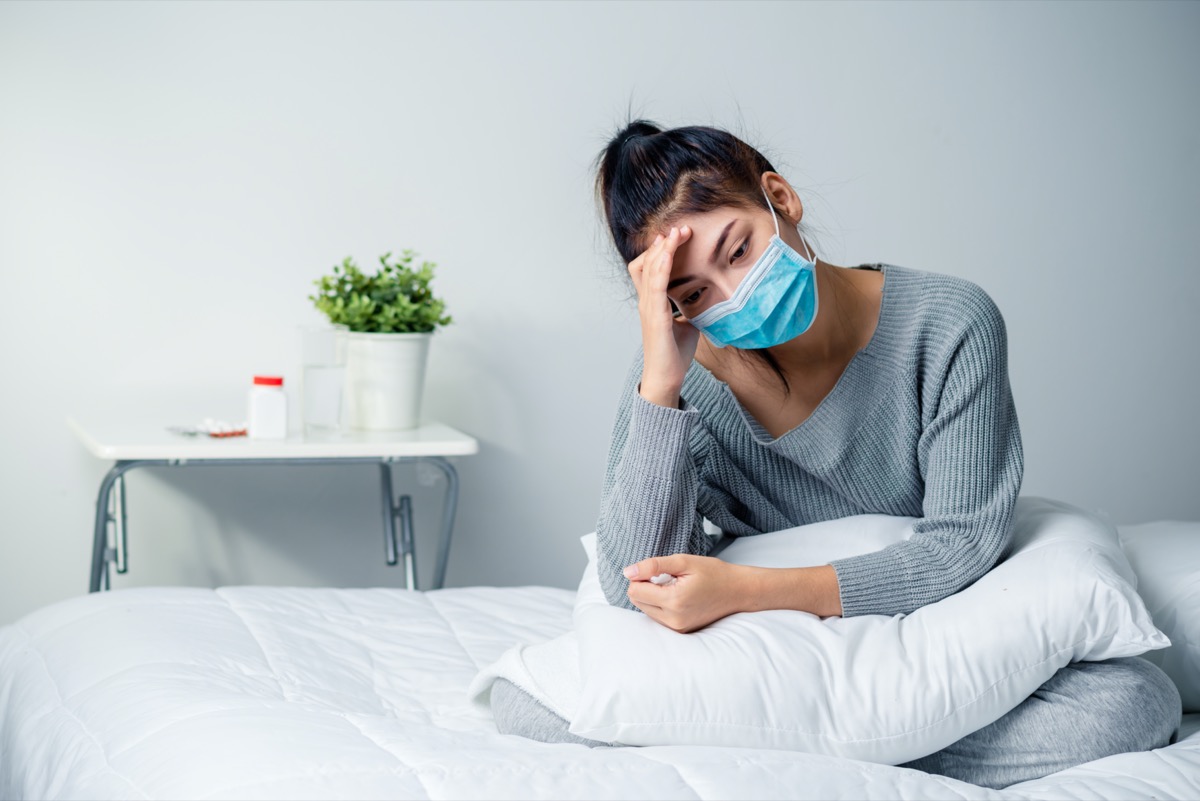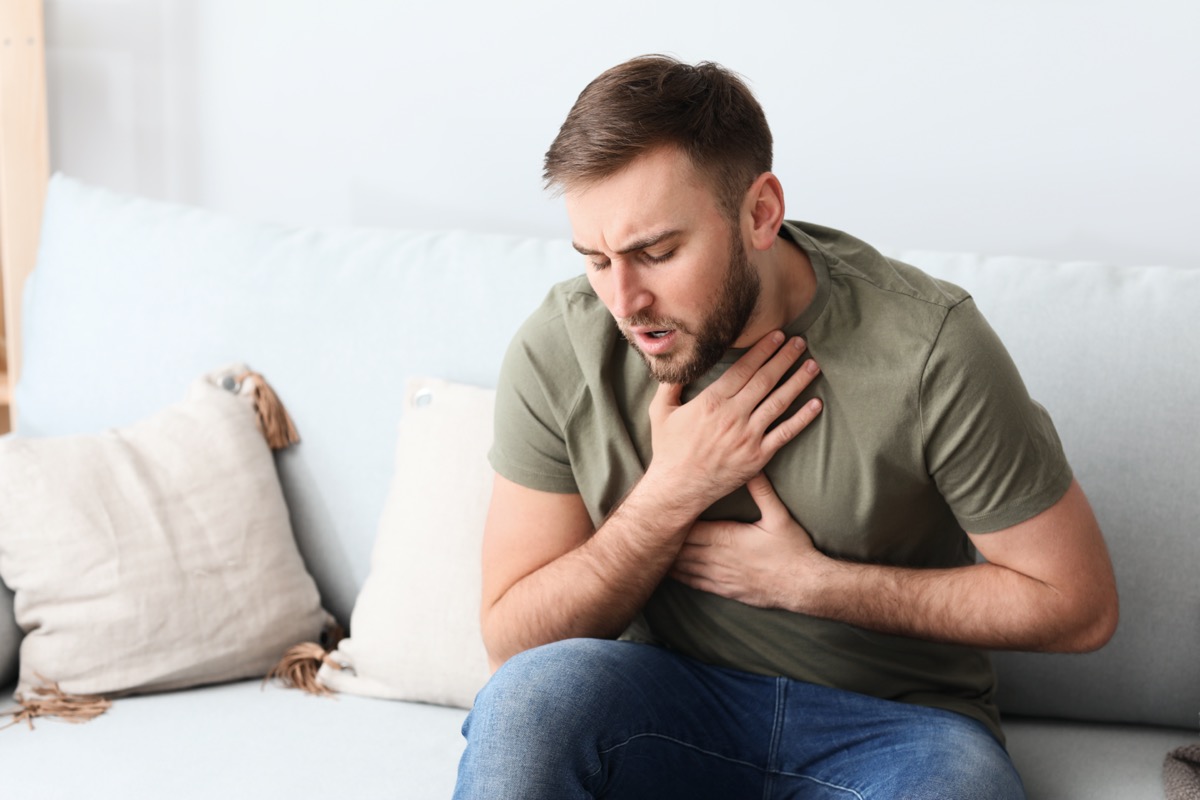Getting coronavirus can be bad, as comedian Chris Rock found out recently. (“Get vaccinated,” he implored his followers after catching a breakthrough infection.) What’s worse is that for some, a “constellation” of terrible, debilitating symptoms may go on and on for months and months, possibly never going away. These symptoms are part of a syndrome called PASC or Long COVID, and can affect up to 10 or 30% of people who get COVID, even a mild case. Read on to see if you have any of the signs and symptoms—and to ensure your health and the health of others, don’t miss these Sure Signs You’ve Already Had COVID.


What: “While many people who get sick with COVID-19 recover quickly and are able to get back to normal health, some people experience symptoms for several weeks and even months,” says Dr. Ryan Westergaard, a faculty member of the Division of Infectious Disease within the Department of Medicine at the University of Wisconsin School of Medicine and Public Health. “This has come to be known as Long COVID and the people who will experience it are sometimes called long haulers…..
Who: “Even people who had very few or no symptoms during their initial COVID illness can develop some combination of long COVID symptoms. Symptoms of long COVID can vary from person to person, but people of all ages, including children and young adults can experience sometimes debilitating symptoms.
Why: “We’re still learning what causes the symptoms of long COVID and how it might affect someone’s future lifestyle, health, and wellness. We still have much to learn about long COVID, but we already know a lot about how to prevent it. COVID-19 vaccines are safe and highly effective way to protect yourself from COVID-19. I recommend everyone get vaccinated to protect yourself and our communities from COVID-19.” Keep reading to see the symptoms.


Dr. Westergaard warns of “chronic fatigue.” Looking at one study, long haulers “very commonly had fatigue,” explains Dr. Roger Seheult of MedCram. “And this happened to be the longest lasting symptom in general.” Like Dr. Fauci, Dr. Seheult said this may resemble Chronic Fatigue Syndrome. In that syndrome, even sleep leaves you unrefreshed; simple chores can exhaust you; and you might experience post-exertional malaise, i.e. a short burst of energy can lead to a “crash” within 24-48 hours.
RELATED: Ways to Reverse Aging Now


“These are long haulers, even with mild COVID-19 infections, you don’t have to be on a ventilator. You don’t have to be hospitalized. You can have long-term effects and brain fog is a prominent one, very commonly seen, one in three people have this kind of symptom,” warns Dr. Mike Cirigliano, a member of the Fox Medical Team. “You can’t focus. You feel tired, your memory has declined, and it can go on and on and on. And that’s a major problem. And another reason why you don’t want this virus.”
RELATED: Sure Signs You May Have Dementia, Says CDC


“Shortness of breath could be a result of lung disease. It could be a result of heart disease. It could be a result of basically deconditioning. You want to know, is it happening at rest on exertion or when laying down, if it’s when laying down that is usually suggestive of congestive heart failure,” says Dr. Seheult. Maybe you feel a butterfly in your chest. “This can often mean that there’s arrhythmias going on.”
RELATED: Major Health Secrets After 50, Say Experts


“Some of the most common symptoms of post-COVID 19 condition, or Long COVID, include shortness of breath, cognitive dysfunction, which people call brain fog, as well as fatigue. Those are the three most common, however, there have been more than 200 symptoms that actually have been reported in patients. So that list is quite long. So other symptoms that patients or people may experience includes things such as chest pain, such as trouble speaking, some have described anxiety or depression, muscle aches, fever, loss of smell, loss of taste. So the list is quite long,” says Dr. Janet Diaz, Team Lead at World Health Organization.
RELATED: Virus Expert Warns These 13 States Will Have Next Surge


There is no silver bullet cure for PASC. “We don’t yet have one. The reason is because we don’t yet understand why this develops. So as we’re learning more about the actual reason or mechanism of the disease developing, then we hope to have a specific treatment,” says Dr. Diaz. As a result: “The care pathways should be multidisciplinary in nature, meaning that they can include your primary care provider as well as a relevant specialist, rehab professionals, social care workers, psychosocial workers, mental health professionals, and that’s the type of care people with post COVID-19 condition should receive in regards to specific treatment.” She says get vaccinated, in any case, and to protect your life and the lives of others, don’t visit any of these 35 Places You’re Most Likely to Catch COVID.